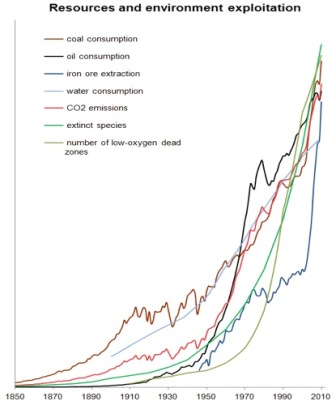When our book Post-Growth Society was published in 2010 in German, the term was entirely unheard of. Today, Post-Growth is the harsh reality in many countries, but this phenomenon is considered to be transitory. Governmental investment subsidies and infrastructure spending, consumer incentive programs and a generous monetary policy are supposed to re-stimulate growth.
Additional governmental expenditures, however, are limited by public debt. Traditional monetary policy is running out of effective instruments. Alternatives unthinkable in ordinary times, such as negative interest rates or helicopter money, are being discussed seriously and implemented selectively. Within the debate about a “secular stagnation”, further measures against the crisis of economic growth are discussed.
Some (few) politicians, scientists and business people start to think about a long-term prospective without growth. But long-term concepts of post-growth, a-growth or degrowth remain officially off the agenda.
Nevertheless, civil society is increasingly discussing the Post-Growth Society – whether at degrowth conferences (such as currently in Budapest), in various initiatives and projects or on this blog.
Interestingly, consumption as the engine of growth in industrialized societies has been a target of criticism from early on, both in theoretical discussions and in individual or collective projects of sustainable living. Equally the topic links back to the sustainability debate. There, promoting production and consumption patterns that are sustainable on a global level is a key objective, as demonstrated by the UN Sustainable Development Goals of 2015.
Although sustainability is based on the principles of efficiency, consistency and sufficiency, politics and science so far have focused strongly on efficiency. The issue of sufficiency – asking how much we need for which purpose – has been neglected, partly because the concept of "less" that is inherent in sufficiency is in conflict with the "more" of economic growth.
Despite these obstacles, sufficiency is gaining momentum. One reason for this is that public interest in alternative lifestyles has increased. Furthermore, research has shown that reckless use of efficient products, enhanced performance requirements and increased quantitative demand easily destroyed efficiency gains (rebound effect). This dampens optimism that an efficiency-only strategy will do the job. Instead of relying solely on technological progress, we will need social and structural change.
As a consequence, sufficiency will also have to be considered a policy field for which suitable strategies must be developed. Uwe Schneidewind and myself have made this demand in our book “The Politics of Sufficiency - Making it easier to live the Good Life” in 2013.
Sufficiency politics affects numerous policy fields: consumption, transportation, urban planning, health, social policy, competition, and taxes. Sufficiency politics can be applied at local, national or international level. It is a new approach that needs time to find new paths in a participative manner.
Sufficiency politics is not only complex but also controversial. Political change in favor of sustainable lifestyles may imply limitations on non-sustainable behaviors, for instance when pedestrians or cyclists receive more space. Such trade-offs are common in politics – in the area of sufficiency, however, they incur a special emotional charge as beloved privileges are threatened.
Strategies for change need sound arguments and positive images – and they need change agents. Therefore, Dominik Zahrnt and I have condensed the book “The Politics of Sufficiency” and developed a digital map. The Sufficiency Politics Map shall help actors from civil society and politics to find their way through the complexities of sufficiency policy, to communicate it successfully and, above all, to act politically.
The target group are those actors from civil society, politics and the business world who wish to promote the debate about sufficiency and develop their own strategies. The digital format of the map invites, in particular, young people who enjoy new forms of communication and cooperation.
The digital „Sufficiency Politics Map“ has been published yesterday on the occasion of the 5th International Degrowth Conference 2016 in Budapest. The map has been presented today at a special session.
We would like to invite you to join the debate about sufficiency politics and its relationship to post-growth and degrowth. And, of course, to take action!
Here you can find further information on the map.
Saturday 1st June 2019 marked a significant occasion for the degrowth movement: the inaugural ‘Global Degrowth Day’. Groups of people gathered together in places all around the world to engage with ideas of degrowth and alternatives to our growth-based society, guided by the event’s theme of ‘a good life for all’. The Global Degrowth Day was coordinated by the Activists and Practitioners int...

By Nafeez Ahmed New research suggests that the ongoing global economic crisis is symptomatic of a deeper crisis of industrial civilization’s relationship with nature. The continuation of the crisis, though, does not imply the end of the world – but rather is part of major phase shift to a new form of civilization that could either adapt to post-carbon reality and prosper, or crumble in denial....

This article is written by Claudia Gómez-Portugal in the scope of the Stream towards Degrowth. As a Mexican activist and promoter of social change she founded the organization SAKBE – Commons for Social Change and the Free Learning Communities for Life Initiative – and commits herself to developing communication strategies for social change, effective participation, [...]